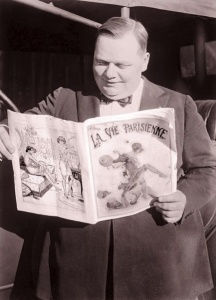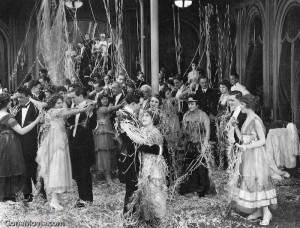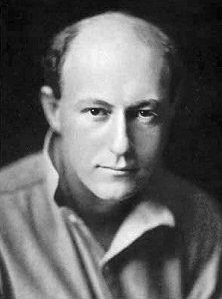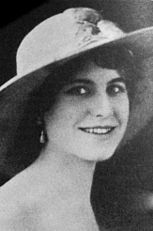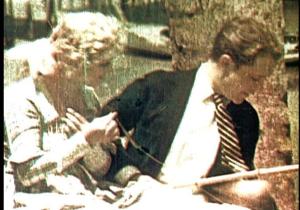On March 4th, 1917, President Woodrow Wilson took the oath of office and began his second term of President. Just a few months earlier, he had run for reelection on a platform of maintaining American neutrality in the war that was ravaging Europe. His slogan was “He Kept Us Out Of War,” and it was enough to allow him to survive one of the closest elections in U.S. History.
Whereas the previous year had been dominated by films, like the Award-winning Civilization, that promoted neutrality and world peace, 1917 saw the release of several films that were designed to support the American war effort. The pacifism of Civilization was forgotten as the box office embraced both patriotism and escapism.
Audiences looking for patriotism flocked to The Little American. Directed by Cecil B. DeMille and starring Mary Pickford, The Little American featured Pickford as Angela, an American woman who falls in love with two soldiers, one German and one French, during the opening days of World War I. Also popular was Universal’s The Man Without a Country, in which a treasonous pacifist is convinced to support the war effort by reading and visualizing Edward Everett Hale’s famous short story.
Audiences looking for an escape from the grim reality of war flocked to see Fox’s Cleopatra, an extravagant recreation of the ancient Rome that starred Theda Bara as Cleopatra and Fritz Leiber, Sr. as Julius Caesar. Also popular was Golden Rule Kate, a comedic western that starred Louise Glaum. Finally, there was William Desmond Taylor’s adaptation of Mark Twain’s Tom Sawyer, starring the popular Jack Pickford (younger brother of Mary) in the title role.
For the first time, there was speculation in some contemporary California newspapers over which films wold actually be nominated for an Academy Award. In the days leading up to the announcement of the nominations, it was generally agreed that the probable nominees for best picture would be Cleopatra, Golden Rule Kate, The Little American, The Man Without A Country, Tom Sawyer, and Wild and Woolly, a Douglas Fairbanks comedy.
When the nominations were announced on January 20th, 1918, The Little American led with 7 nominations, followed by Cleopatra with 6, Tom Sawyer with 5, and Golden Rule Kate and The Man Without A Country with 4 each. With the exception of a nomination for director John Emerson, Wild and Woolly was almost totally snubbed. Instead, the 6th best picture nomination went to One Law For Both, a little-seen melodrama from independent filmmaker Ivan Abramson that managed to tie Tom Sawyer with a total five nominations.
As a part of his effort to attract more industry professionals into the organization, Academy President Thomas H. Ince again reformed the voting process, doing away with the jury system. While the nominations were still made by the individual branches, the 1917 awards were the first to be voted on by the entire membership of the Academy.
The ceremony was held, at the Hollywood Hotel, on the evening of February 20th, 1917. The ceremony was again hosted by the popular comedian Roscoe “Fatty” Arbuckle and also featured a speech from U.S. Senator Hiram Johnson.
The awards were a family affair, with siblings Mary and Jack Pickford winning both of the acting awards. (This was Mary Pickford’s third nomination and second victory.) The Little American won best picture, with Cecil B. DeMille winning his second award for Best Director, Drama. William Desmond Taylor won the award for Best Director, Comedy while Cleopatra settled for two technical awards.
The Fourth Annual Academy Awards
(Honoring films released in the U.S. between January 1st and December 31st, 1917. Winners are starred and listed in bold)
Best Picture
Cleopatra. Produced William Fox. Directed by J. Gordon Edwards. Fox Films.
Golden Rule Kate. Produced by Thomas H. Ince. Directed by Reginald Barker. Triangle Distributing.
*The Little American. Produced by Mary Pickford. Directed by Cecil B. DeMille. Artcraft.
The Man Without A Country. Produced by Edwin Thanhouser. Directed by Ernest C. Warde. Universal.
One Law For Both. Produced and Directed by Ivan Abramson. Ivan Film.
Tom Sawyer. Produced by Jesse L. Lasky. Directed by William Desmond Taylor. Paramount.
Best Director, Comedy
John Emerson for Wild and Woolly. Artcraft.
Wray Physioc for The Gulf Between. Technicolor Motion Picture Corp.
*William Desmond Taylor for Tom Sawyer. Paramount.
Maurice Tourneur for The Poor Little Rich Girl. Artcraft.
Best Director, Drama
Ivan Abramson for One Law For Both. Ivan Film.
Reginald Barker for Golden Rule Kate. Triangle Distributing.
*Cecil B. DeMille for The Little American. Artcraft.
J. Gordon Edwards for Cleopatra. Fox Films.
Best Actor
John Barrymore in Raffles, the Amateur Cracksman. Hiller & Wilk.
Holmes Herbert in The Man Without A Country. Universal.
Harold Lockwood in Paradise Garden. Metro Pictures.
*Jack Pickford in Tom Sawyer. Paramount.
Best Actress
Theda Bara in Cleopatra. Fox Films.
Rita Jolivet in One Law For Both. Ivan Film.
*Mary Pickford in The Little American. Artcraft.
Kathlyn Williams in Big Timber. Paramount.
Best Writing
*The Little American. Jeanie MacPherson. Artcraft.
Cleopatra. Adrian Johnson. Fox Films.
One Law For Both. Ivan Abramson. Ivan Film.
Tom Sawyer. Julia Crawford Ivers. Paramount.
Best Cinematography
The Bad Boy. David Abel. Triangle Distributing.
*Cleopatra. George Schniederman. Fox Films.
Golden Rule Kate. Joseph August. Triangle Distributing.
The Little American. Alvin Wyckoff. Artcraft.
Best Art Design
*Cleopatra. George James Hopkins. Fox Films.
The Little American. Wilfred Buckland. Artcraft.
The Poor Little Rich Girl. Ben Carre. Artcraft.
Tom Sawyer. Homer Scott. Paramount.
Best Engineering Effects
The Little American. Joseph Levering. Artcraft.
The Man Without A Country. Ernest C. Warde. Universal.
Straight Shooting. George Scott. Universal.
*The Gulf Between. Carl Gregory. Technicolor Motion Picture Corp.
Best Title Writing
Camille. Adrian Johnson. Fox Film Corporation.
Golden Rule Kate. Monte M. Katterjohn. Triangle Distributing.
The Man Without A Country. Lloyd Lonergan. Universal.
*One Law For Both. Ivan Abramson. Ivan Film.
Films By Number of Nominations:
7 Nominations — The Little American
6 Nominations — Cleopatra
5 Nominations — One Law For Both, Tom Sawyer
4 Nominations — Golden Rule Kate, The Man Without A Country
2 Nominations — The Gulf Between, The Poor Little Rich Girl
1 Nominations — The Bad Boy, Big Timber, Camille, Raffles The Amateur Crasksmith, Paradise Garden, Straight Shooting, Wild and Woolly
Films By Number Of Awards
4 Awards — The Little American
2 Awards — Cleopatra, Tom Sawyer
1 Awards — The Gulf Between, One Law For Both
Studios By Number Of Nominations
10 Nominations — Artcraft
7 Nominations — Fox Film
6 Nominations — Paramount, Universal
5 Nominations — Ivan Film, Triangle Distributing
2 Nominations — Technicolor Motion Picture Corp.
1 Nominations — Hiller & Wilk, Metro Pictures
Studios By Number of Awards
4 Awards — Artcraft
2 Awards — Fox Film, Paramount
1 Award — Ivan Film, Technicolor Motion Picture Corp.
Trivia
For the first time, the entire Academy membership votes for the awards.
Best Actor winner Jack Pickord and Best Actress winner Mary Pickford are siblings.
Mary Pickford is the first woman to win the award for best picture.
Mary Pickford wins her second award for acting.
Cecil B. DeMille wins his second award for directing and his second award for best picture.
